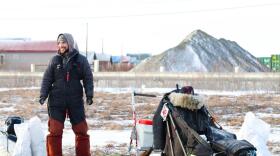Despite the stringent COVID-19 mitigation measures the K300 race committee took during this year’s K300, a volunteer at the Aniak halfway checkpoint tested positive for the virus during the race after mushers had passed through Aniak.
The volunteer, who was indoors interacting with mushers, community members, and K300 staff, tested positive for COVID-19 the morning after the race came through Aniak, according to K300 race committee member Erich Kuball, who lives in Aniak.
“That person had a dry throat. So took a home test and tested positive,” Kuball said.
The positive test occurred on the morning of Jan. 30, about half a day after the last musher left the Aniak checkpoint.
This year, the K300 race committee introduced stringent regulations to try to keep COVID-19 at bay. They mandated that all volunteers, staff, and mushers be fully vaccinated against COVID-19. They wanted the race to be able to go on. The K300 has never been cancelled in its 43-year history, though it has been postponed plenty of times.
Then, as the omicron variant caused new case counts of the virus to surge to their highest point ever in the region, the K300 race ramped up its mitigation measures in the week leading up to the race. It required all participants to test for COVID-19 before the race. It also closed indoor checkpoints to fans.
In Aniak, volunteers tested on Friday, Jan. 28, the day before mushers came to town. They either took home tests or were tested at the clinic. The person who later tested positive on Sunday, Jan. 30 had previously tested negative on Jan. 28, along with the other volunteers. While the checkpoint was active on Saturday, Jan. 29, Kuball said that person was wearing protection.
“That person was masked up, Carhartt-ed up, gloved up, you know. It was a cold day, mainly worked outside, but was sometimes inside,” Kuball said.
Kuball said that the person told him that they were masked up when in the building, though he said that he didn’t know if they removed their mask to eat. Volunteers remained masked inside except when consuming food, though the mushers who came through were generally unmasked.
The Centers for Disease Control and Prevention (CDC) defines a close-contact to a COVID-19 positive person as a person who spent a cumulative total of 15 minutes with them less than 6 feet away.
After the positive test, race manager Paul Basile consulted with the Yukon-Kuskokwim Health Corporation (YKHC). He said in an emailed statement to KYUK that YKHC described the setting and exposure level as "low-risk" to most people at the checkpoint. Basile said that close contacts have been notified, and that the K300 race committee is issuing letters to mushers informing them of the COVID-19 case.





